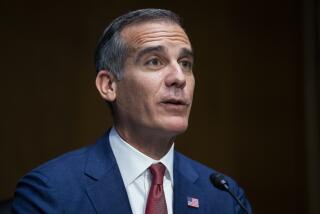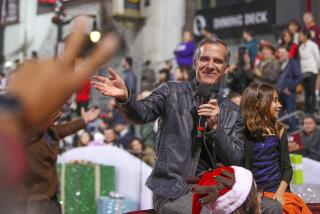Eric Garcetti for mayor
Los Angeles is an underachieving city led in recent decades by a succession of underachieving mayors — people who came in with big dreams or big talk but soon got bored with the day-to-day task of steering a municipality. Voters don’t get to conduct a casting call or sift through hundreds of applicants until they identify the ideal candidate, but must instead choose from a field prescreened by the political and fundraising processes. This year that field fails to include a candidate who stands out as the obviously superior choice. The task for voters then becomes to scrutinize track records, eliminate the worst hazards and seek potential that can be forged, with the proper pressure and continued voter vigilance, into accomplishment.
The candidate with the most potential to rise to the occasion and lead Los Angeles out of its current malaise and into a more sustainable and confident future is Eric Garcetti.
Voters must be frank with themselves about Garcetti, who as a member of the City Council for nearly 12 years and its president for six must bear some responsibility for the city’s current fiscal problems, which were dramatically worsened when the council negotiated employee contracts that were unaffordable, leading to a budget too far out of balance, and leading, in turn, to deep cuts in services.
ENDORSEMENTS: Los Angeles City Elections 2013
But frankness also requires scrutiny of Garcetti’s role in beginning to correct the problems. For the most part, he has performed well. As council president, he worked behind the scenes to awaken his colleagues to the depth of the city’s financial crisis and to take action they did not want to take, imposing layoffs and requiring those remaining in the workforce to shoulder more of the burden of their medical and pension benefits. At times when Mayor Antonio Villaraigosa should have been on hand to close difficult negotiations, the task was left to Garcetti, and he came through. He antagonized his allies in labor, not because he wanted to but because he saw that he had to. That fact undermines the too-common chatter that he lacks backbone.
His style as council president was not always satisfying to outside observers, who like to hear leaders talk tough or watch them crack heads. Garcetti used finesse. He knew who he was leading, he knew how to get from them what was needed and he knew how to count votes. He knew how to get the job done, and he did it — or at least as much of it as could be done at the time. Los Angeles will look in vain for its Ed Koch or its Richard Daley, because the job here simply isn’t tailored for that kind of swagger. Successful mayors of Los Angeles — like Tom Bradley — must be experts in the art of finesse. Garcetti is such an expert.
They also must be experts in using the tools at their disposal to create a vibrant and livable city. Voters should be inspired by Garcetti’s stewardship of Council District 13. His predecessors may have laid the foundation for the revival of Hollywood, but Garcetti closed the deal with creative land-use decisions and community outreach that returned an edgy spark to the neighborhood while attracting new business and providing new housing for families living on the margins. Under his guidance, Atwater Village has blossomed, Glassell Park is on the verge, Silver Lake and Echo Park are cultural touchstones, East Hollywood neighborhoods have claimed their identity. He added many acres of badly needed park space. He brought to his job a deft mixture of community organizing, development, outreach and leadership. He has not left everyone in his district happy, because he has made choices — and that’s a good thing. It requires a measure of courage, and is an indication of leadership. Along the way he championed programs in his district to deter gang violence and fight quality-of-life crimes such as graffiti, and they became models for citywide successes.
VIDEO: Interviews with L.A.’s mayoral candidates
Many of Garcetti’s achievements have parallels in the downtown and South Los Angeles district of Jan Perry, who is also running for mayor. Perry’s warnings about the budget and employee compensation were earlier and firmer than Garcetti’s, and her penchant for speaking her mind, no matter the consequences, is appealing. So why not Perry for mayor? In large part because her strengths are also her weaknesses, and they too often undermine her. The highest-profile example is her battle with Garcetti’s successor as council president, Herb Wesson Jr., a fight that by her own account resulted in her district being redrawn as the city’s poorest, encompassing only a fraction of the resource-heavy downtown it previously did. Voters need not shy away from Perry merely because she can be combative, but they must ask themselves whether that characteristic has helped or hurt. Perry is often right, but being right is not enough. Garcetti, if elected, is more likely to be an effective and successful mayor.
Controller Wendy Greuel is smart and ambitious, and she has enjoyed the built-in advantage of being city government’s official critic, making her the chief advocate for voters and taxpayers. To some degree she has been an able fiscal watchdog, insisting, for example, that the city build up a prudent reserve fund as council members sought to instead spend down the inadequate reserve to avoid layoffs. But she has failed to fulfill her office’s potential.
Four years ago, she asserted that because she was less abrasive than her predecessor, Laura Chick, she would be more successful in getting City Hall to heed her audits and follow her advice. She now acknowledges that City Hall has not been responsive but claims that she could, as mayor, do what she could not do as controller. That is not an argument that inspires confidence.
Nor has Greuel been as innovative as Chick, who saw the potential of her office beyond performing audits and critiquing the status quo. For example, as others in City Hall read and prepared to shelve a report from the Advancement Project’s Connie Rice on dealing with the city’s growing gang problem, Chick studied it, championed it and demanded that failed programs be dropped and a new one based on Rice’s blueprint be housed directly in the mayor’s office. In so doing, Chick forced City Hall to rethink itself and to discover new, effective partnerships and protocols for measuring success. She made her office count. She showed the type of initiative and creativity demonstrated on the council by Garcetti. In comparison, Greuel has been overly cautious and less effective than she could have been. It is hard to see how she would rise to the challenge as mayor given her record as controller.
Also running is entertainment lawyer and talk radio host Kevin James, who, when confronted with the poor management and stifling bureaucracy that have gotten City Hall into trouble, sees full-scale corruption. He sees transfers of money from special funds to create an adequate reserve as corruption rather than prudence; he sees generous contracts to city employees as corruption rather than lazy bargaining and bad management.
It’s an approach well suited to radio and no doubt appealing to listeners and many voters, who would like to believe that if only the rascals are thrown out and replaced with untainted outsiders, everything in Los Angeles will fall into place. But running a city is a complicated business. James is interesting and his words are riveting, but his critique is wrong. City Hall has been too long without someone who knows how to run it, and a lack of leadership, a lack of mission and discipline, have led to low-quality work being delivered by a high-quality workforce.
James is at his best when he drops the talk of corruption and zeros in on one major cause of the city’s troubles: the employee contract of 2007. But his prescription is overly simplistic: Change the players. The city has had mayors with too much “outsider” posturing and too little knowledge of how to run the place.
Emanuel Pleitez has made a name for himself in this race but is a long way from being ready to lead a great city. Like James, he relies too much on the argument that his “outsider” status, by itself, would be a cure for City Hall’s ailments. Those who are disappointed in Villaraigosa should remember that he ran as an outsider and had been on the council for only two years when he ran for mayor, and his lack of familiarity with City Hall — his lack of finesse — is part of what doomed his administration.
Voters at first embraced Villaraigosa because they saw in him the power to inspire. Garcetti has that too, but in a different, quieter fashion, and he backs it up with experience in City Hall, a share of troublesome mistakes and 12 years of achievement. If he avoids a tendency to be glib when he should motivate, and if he avoids the tendency to allow his finesse to give way to a desire to be all things to all people, he could be just what Los Angeles needs. At this time, out of this field, he’s the best choice for mayor.
More to Read
A cure for the common opinion
Get thought-provoking perspectives with our weekly newsletter.
You may occasionally receive promotional content from the Los Angeles Times.










